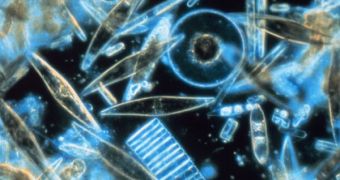The tropical Atlantic Ocean could become a net carbon dioxide sink, say the results of a study which found that seasonal blooms of ocean plankton fertilized by the waters of the Amazon river absorb more carbon dioxide than previously estimated. The waters extending from the mouth of the Amazon into the Atlantic ocean, the study found, appear to sustain a prosperous population of plankton that converts nitrogen absorbed from the atmosphere into nutrients that can be later used by other living beings.
Through this particular process the plankton can thrive in the nitrogen-poor waters of the Amazon and feed off other nutrients such as phosphorus and silicon found in the river, which in turn results in a significant growth in the population, absorbing large amounts of carbon dioxide during photosynthetic processes.
Furthermore, the study carried out by Ajit Subramaniam of the Lamont-Doherty Earth Observatory in Palisades, suggests that unlike other carbon sinks around the world that keep carbon dioxide in storage for short amounts of time before releasing it back into the atmosphere, this process ensures that it remains locked up in photosynthesisers. Because these substances are diatoms, carbon dioxide is used to build the silica shells around the bodies of the plankton.
As these single celled-algae die, they sink along with the shell towards the bottom of the ocean, thus locking up to 20 million tons of carbon every year. This is very little as compared to the 2 gigatons of carbon dioxide released into Earth's atmosphere every year, though it is an important contribution nonetheless. According to Subramaniam, although other tropical rivers around the world are much smaller than the Amazon, similar effects could be observed in Congo or even Orinoco, but further tests are required before confirming this theory.
"I think the value of this work is not so much in figuring out how we can use it to humankind's advantage, but in figuring out that the major rivers of the world may be helping to balance the CO2 inventory of the planet in ways we haven't realized before," says David Karl, an oceanographer at the University of Hawaii.
In the end, the idea of artificially fertilizing the oceans in order to enhance their carbon intake may not be so bad after all said Subramaniam, again bringing up the surprising results of the study he conducted.

 14 DAY TRIAL //
14 DAY TRIAL //